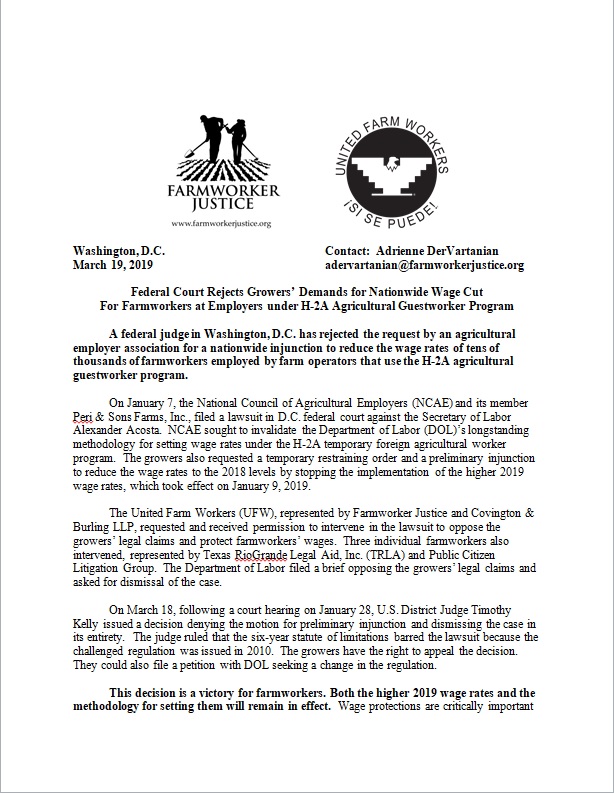FOR IMMEDIATE RELEASE Farmworker Justice, Washington, D.C.
August 16, 2019
CONTACT
Bruce Goldstein, Farmworker Justice 202-800-2521 bgoldstein@farmworkerjustice.org
National Immigration Law Center: Hayley Burgess, 202-384-1279, media@nilc.org
Western Center on Law & Poverty: Courtney McKinney, 214-395-2755, cmckinney@wclp.org
Asian Americans Advancing Justice – Los Angeles: Alison Vu, avu@advancingjustice-la.org
Federal Lawsuit Filed to Overturn Trump “Public Charge” Immigration Regulation
Low-Wage Agricultural Workers and Family Members Will Be Among the Victims
SAN FRANCISCO — Organizations serving immigrant communities and advocates for racial equity, health, children, farmworkers, and working families today filed suit to block implementation of the Trump administration’s “public charge” regulation, which threatens millions of immigrant families — disproportionally families of color.
Farmworker Justice of Washington, D.C. is a plaintiff in the lawsuit, which is entitled La Clínica de la Raza et al. v. Trump et al., filed in the U.S. District Court for the Northern District of California. The lawsuit asks the court to declare the regulation issued by the U.S. Department of Homeland Security (DHS) unlawful and unconstitutional. DHS finalized the regulation on August 14, 2019.
“Farmworkers and other low-wage immigrant workers will be disproportionately harmed by this rule. Farmworkers perform honorable, difficult work but their wages are among the lowest of any occupation and their poverty rates are substantially higher than the national average,” said Bruce Goldstein, President of Farmworker Justice. “This cruel policy change will unfairly deny hard-working farmworkers and their family members the opportunity to become immigrants and citizens,” he said. He added, “In addition, the rule’s discrimination against people who use public programs for which they are eligible based on their low-wages will cause them to avoid such programs, harming their families’ health and nutrition.”
In addition to Farmworker Justice, the suit was brought by La Clínica de la Raza, African Communities Together, the California Primary Care Association, the Central American Resource Center, the Council on American Islamic Relations – California, the Korean Resource Center, the Legal Aid Society of San Mateo County, and Maternal and Child Health Access.
The plaintiffs are represented by the National Immigration Law Center, Asian Americans Advancing Justice – Los Angeles, the National Health Law Program and the Western Center on Law and Poverty.
Plaintiffs assert that the regulation violates the Administrative Procedure Act because it is contrary to law and arbitrary and capricious. The complaint also argues that the regulation is invalid because the official who approved its publication, Kenneth T. Cuccinelli, was appointed in violation of the Constitution’s Appointments Clause and the Federal Vacancies Reform Act.
In addition, the complaint argues that the regulation was motivated by racial bias against nonwhite immigrants and asks the court to strike it down as a violation of Equal Protection under the Fifth Amendment of the U.S. Constitution. The large majority of agricultural workers in the United States are Latino and the large majority are immigrants, mostly from Mexico. As indicators of a motivating racial animus, the complaint cites the administration’s acknowledgement that the policy will have a disparate impact on families of color, President Donald Trump’s own racist statements, and his administration’s other racially-biased policies.
“This rule change is a direct attack on communities of color and their families, and furthers this administration’s desire to make this country work primarily for the wealthy and white. Our immigration system cannot be based on the racial animosities of this administration, or whether or not people are wealthy,” said Antionette Dozier, senior attorney at the Western Center on Law and Poverty.
More than 260,000 public comments were submitted on the draft regulation last fall, the vast majority in opposition. The regulation targets programs that serve whole families — Medicaid, the Supplemental Nutrition Assistance Program, and Section 8 housing assistance — meaning its impact will extend well beyond immigrants directly affected. As a result, experts warn, the regulation will result in increases in hunger, unmet health and housing needs, and poverty. Because affected immigrants are overwhelmingly immigrants of color, the rule is also expected to widen racial disparities. Independent analysts estimate that the regulation threatens millions of people. A significant portion of those threatened by the regulation were born in the U.S., and nearly a third of those are children.
The complaint asserts that the public charge regulation threatens the missions of the plaintiff organizations and the communities they serve.
“The Trump administration has deliberately designed this policy to target families of color, which is part of its overall blueprint to change the face of what we look like as a nation and who is considered worthy of being an American. It threatens immigrants of color with exclusion and Americans of color with deprivation or family separation. And it aims to deny working-class immigrants of color the ability to thrive in the land of opportunity,” said Marielena Hincapié, executive director of the National Immigration Law Center. “We will not stand for it. We’re fighting back against this racist policy, and we’re going to win the fight to protect immigrant families.”
Today’s filing is available at https://www.nilc.org/wp-content/uploads/2019/08/Clinica-de-la-Raza-v-Trump-complaint-2019-08-16.pdf.



